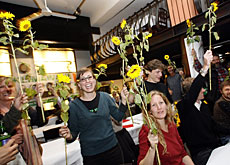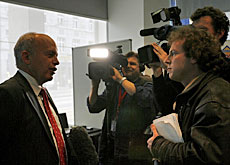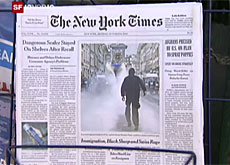Swiss press digest swing to the right

Swiss newspapers say the large gains of the rightwing Swiss People's Party in Sunday's elections point to a major shake-up of the political landscape.
The People’s Party boosted its standing as the biggest group in parliament, scooping 29 per cent of the vote. The other big winner was the Green Party, while the centre-left Social Democrats suffered a major defeat.
“After the 2003 elections, this time the People’s Party achieved a real result,” wrote the Tages-Anzeiger newspaper, reflecting on the best showing for a political party in Switzerland since 1919.
“As a party with two cabinet members, it has managed to gain the support of many discontented people,” it continued.
The Bern-based Der Bund newpaper described the victory as a show of strength.
“Using a lot of money, the party has led a targeted, emotional campaign on foreigners, violent youths and the Messiah Blocher, and it has benefited from the Roschacher case and the Bern riot,” it said.
Figurehead Christoph Blocher is accused of plotting to oust former chief prosecutor Valentin Roschacher, who resigned last year.
Party posters featuring white sheep kicking out a black sheep sparked outrage that was blamed in part for a riot two weeks before the election.
According to the tabloid paper Blick, the People’s Party success is down to two things: anti-foreigner propaganda and Christoph Blocher. “The black sheep posters probably discouraged many voters, but also pulled in many others.”
But it warned that politicians would have to find a middle ground. “As the citizens want solutions that will make definite improvements to their lives, as well clear-sighted decisions for the country.”
“Broken mechanism”
The French-speaking Le Temps wrote: “Beyond the disaster of the Social Democrats, the Swiss political landscape has been shaken by the victory of the People’s Party, which is experiencing its crowning moment.”
It added: “The extremely polarising campaign of this party has once more resulted in the hoped-for mobilisation; but will its success force the party to be consensual and transform it into a constructive force rather than opposition?”
According to the Geneva-based Tribune de Genève, “the carefully balanced Swiss mechanism is broken and the consensus-based political system is under threat”.
The standing of the People’s Party was particularly aided by gains made in French-speaking Switzerland. In canton Geneva, for example, the right-wing party leapfrogged the Social Democrats to become the leading party.
“It’s as if the last anti-Blocher bastion in Switzerland has fallen, crushed by the irresistible push of the traditional rightwing party,” wrote the Tribune de Genève, which added that the Social Democrats’ blaming the People’s Party’s “phenomenal” election campaign spending was “insufficient”.

More
House of Representatives
Glaring truth
The papers also reflected on the identity crisis for the Socials Democrats, which took 19.5 per cent of the vote, down almost four percentage points.
“If they want to stop their fall, it is urgent that the socialists recognise a glaring truth. From Zurich to Geneva they no longer answer the questions and needs of the Swiss who are desperately seeking guidance in this globalised era,” wrote the Tribune de Genève.
Le Temps said the Social Democrats, like similar parties in France and Germany, were “suffering over their fate”.
“By failing to choose between its social and centre wings and between defending the little people and the wealthy middle- and upper-middle classes, the party is losing on both fronts,” it went on.
For the Italian-speaking Corriere del Ticino, those expecting a turning point in these elections will be disappointed.
But it said that the fact that [one party’s] campaigning was founded on a daring marketing campaign meant that other political forces would have to ask themselves whether they have to adopt countermeasures – and perhaps fair play and discretion would have to give way to a more aggressive tone.
The end, it said, had justified the means.
swissinfo

More
Consensus politics and power-sharing
Voters chose the 200 members of the House of Representatives and most members of the Senate for the next four-year term.
The four main parties – People’s Party, Social Democrats, Radicals and Christian Democrats – control more than 75% of the seats in parliament and share the seven cabinet posts.
An alliance of Greens and other leftwing parties is the biggest opposition grouping.
Both houses of parliament will meet on December 12 to elect the new cabinet.
A total of 44 Swiss expatriates were standing for a seat in the House of Representatives – three times more than in 2003.
According to the Organisation of the Swiss Abroad (OSA), between 30% and 50% of Swiss living abroad who are registered to vote were expected to exercise their right.
Over 110,000 Swiss abroad were registered to vote.
House of Representatives
People’s Party: 62 seats (+7, compared with 2003)
Social Democratic Party: 43 seats (-9)
Radical Party: 31 seats (-5)
Christian Democrats: 31 seats (+3)
Greens: 20 seats (+6)
Others: 13 seats (-2)
Total: 200 seats
Results from the elections to the Senate are incomplete.
The Green Party won its first seat in the 46-member chamber.
Run-off elections are needed in eight of the country’s 26 cantons.

In compliance with the JTI standards
More: SWI swissinfo.ch certified by the Journalism Trust Initiative



You can find an overview of ongoing debates with our journalists here. Please join us!
If you want to start a conversation about a topic raised in this article or want to report factual errors, email us at english@swissinfo.ch.